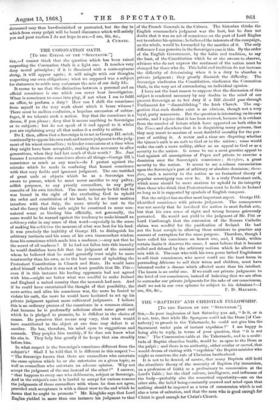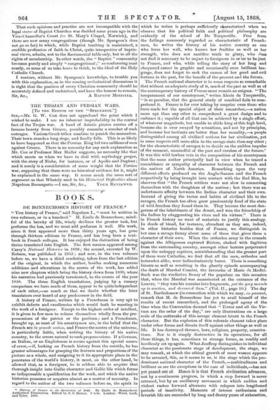THE "BAPTISTS" AND CHRISTIAN FELLOWSHIP. [To THE EDITOR OF THE
"SPECTATOR."]
SIR,—In your impiession of last Saturday you ask, "Is it, or is it not, true, that while Mr. Spurgeon could ask the Dean [of Can- terbury] to preach in the Tabernacle, he could not give him the Sacrament under pain of instant expulsion ?" I am happy in being able to reply, in terms of your question, that "it is not true." The Communion-table at the Tabernacle, and in a multi- tude of Baptist churcluss beside, would be as open to the Dean as the pulpit ; and there is no authority, either secular or sacred, that would dream of visiting with "expulsion" the Baptist minister who might so construe the rule of Christian brotherhood.
It is not to be denied, of course, that many Baptists still hold the ritualistic theory of the necessity of Baptism (by immersion, on a profession of faith) as a preliminary to communion at the Lord's Table ; but the chief culture, intelligence, and influence of the body—probably also the numerical superiority—are on the other side, the belief being constantly avowed and acted upon that nothing should be imposed as a term of communion which is not also a term of salvation, and that the man who is good enough for Christ is good enough for Christ's Church.
That such opinions and practice are not incompatible with the legal status of Baptist Churches was decided some years ago in the Vice-Chancellor's Court (re St. Mary's Chapel, Norwich), and there are now many congregations (though Mr. Spurgeon's does not go so far) in which, while Baptist teaching is maintained, a credible profession of faith in Christ, quite irrespective of baptis- mal views, admits, not to the Sacramental table only, but to all the rights of membership. In other words, the " Baptist " community becomes purely and simply "congregational ;" so conforming most nearly, as some of us take leave to think, to the ideal of the Holy Catholic Church.
I venture, without Mr. Spurgeon's knowledge, to trouble you with this explanation, as in the coining ecclesiastical discussions it is right that the position of every Christian community should be accurately defined and understood, and have the honour to remain,































 Previous page
Previous page